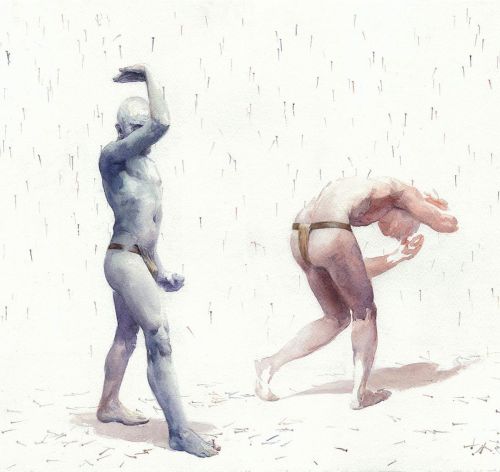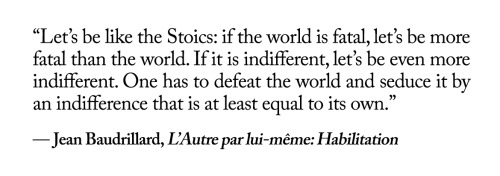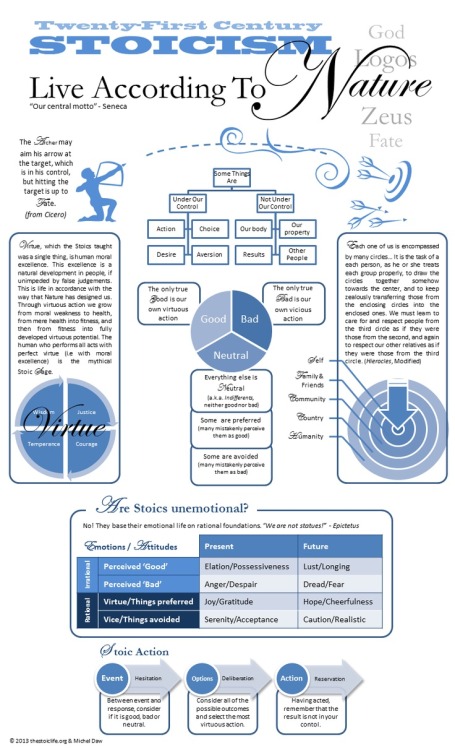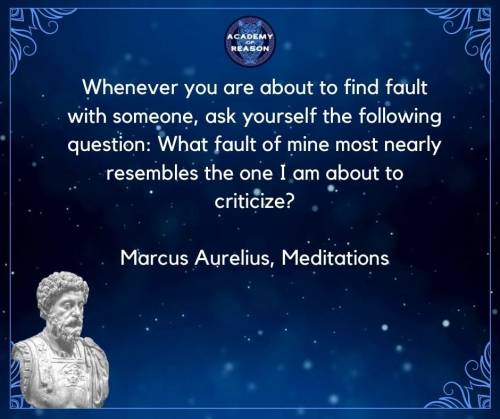#stoicism
What is worse than not being loved? Knowing that no one loves you.
5: The Road Ahead
2017 was a whirlwind of a year. I was making up for my hermit-like college years with ferocity–in addition to working at the Lab of O, I had joined two church choirs, gotten engaged in some community volunteering, and was socializing most nights of the week and weekend. Everything was going well and sprinting forward, and I could see a concrete future for myself coalescing that checked all of my boxes–something I’d been pursuing since I left my parent’s home 10 years prior.
Then a significant personal snag occured, and that envisioned future became so much fog. I was not sure what was next again.
It was in that fog, sitting at a coffeeshop in Burlington, VT, that I painted this image that went on to be my Christmas card for the year. I wasn’t very familiar with Stoicism at the time, but had unconsciously made for myself a little Stoic scholar in the form of this ruffed grouse.
The untouched snow ahead beckons. There are many ways to leave a trail, and all of them lead to life–with the right attitude, a life lived well. But no matter what, your job as One Who Lives is to press on–one foot in front of the other.
#happyholidays #throwback #advent #birdart #whimsical #watercolor #inkbirds #winterbirds #birdartist #theroadahead #journey #memories #ruffedgrouse #gouache #stoicism
https://www.instagram.com/virginiagreeneillustration/p/CXv8BGwrm3x/?utm_medium=tumblr
Post link
“How much time he gains who does not look to see what his neighbor says or does or thinks, but only at what he does himself.”—Marcus Aurelius,Meditations
“No condition is so bitter that a stable mind cannot find some consolation in it.” ~ Seneca
“Things that were hard to bear are sweet to remember.”
-Seneca,Hercules Furens
“Keep ready the gifts you have been given as if they are to be for an indefinite time, but be always prepared to return them when called upon, without sorrow.”
Seneca
There are more things, Lucilius, that frighten us than injure us, and we suffer more in imagination than we do in reality
Moral Letters to Lucilius - Seneca.
“It is in no man’s power to have whatever he wants; but he has it in his power not to wish for what he hasn’t got, and cheerfully make the most of the things that do come his way.”
Seneca
“No pleasure is in itself evil, but the things which produce certain pleasures entail annoyances many times greater than the pleasures themselves.”— Epicurus, Principal Doctrines
“Your life is what your thoughts make it.”—Marcus Aurelius,Meditations
“Characteristics of the rational soul: self-perception, self-examination, and the power to make of itself whatever it wants.”— Marcus Aurelius, Meditations (11.1)
Notice what’s actually happening, not just what you think is happening or wish were happening. Look and listen.
Epictetus

This one hit different today.
El cuerpo concentrado en sus potencias.
ESTOICO: la lluvia / Watercolor on Fabriano 300 grms / 50 x 37 cm / 2021
Visitwww.santiagocaruso.com.ar for more.
#rain #lluvia #nails #clavos #plaga #peste #dolor #pain #estoico #estoicismo #stoicism #filosofia #phylosophy #art #painting #watercolor #acuarela #body #cuerpo #santiagocaruso
https://www.instagram.com/p/CNsQquUA4Ka/?igshid=1hinroh2tdf4f
Post link
Don’t sweat the small stuff,
they said,
so I became an elephant instead
Larger than life,
unbothered by sticks,
no time for stones
Outgrowing their words,
I walk along
rock-steady,
unbreakable bones.
- stoic
The years teach much what the days never know.
—Ralph Waldo Emerson
People of real strength are as rare as gold, and if you find them, you should respond as if you had discovered a treasure.
—Robert Greene
My formula for greatness in a human being is amor fati: that one wants nothing to be different, not forward, not backward, not in all eternity. Not merely bear what is necessary, still less conceal it—all idealism is mendacity in the face of what is necessary—but love it.
—Friedrich Nietzsche
“In the morning, when you rise unwillingly, let this thought be present: I am rising to the work of a human being.Why then am I dissatisfied if I am going to do the things from which I exist and for which I was brought into the world? Or have I been made for this, to lie under the blankets and keep myself warm? But this is more pleasant. Do you exist then to take your pleasure, and not at all for action or exertion? Do you not see the little plants, the little birds, the ants, the spiders, the bees working together to put in order their separate parts of the universe? And are you unwilling to do the work of a human being, and do you not make haste to do that which is according to your nature? But it is necessary to take rest also. It is necessary: nature, however, has fixed bounds to this, too: she has fixed bounds both to eating and drinking, and yet you go beyond these bounds, beyond what is sufficient; yet in your acts it is not so, but you stop short of what you can do. So you do not love yourself, for if you did, you would, love your nature and her will. But those who love their several arts exhaust themselves in working at them unwashed and without food; but you value your own nature less than the engraver values the engraving art, or the dancer the dancing art, or the lover of money values his money, or the vainglorious man his little glory. And such men, when they have an ardent passion for a thing, choose neither to eat nor to sleep rather than to perfect the things that they care for. But are the acts that concern society more vile in your eyes and less worthy of your labor?”
- Marcus Aurelius. Meditations.
Art: Edward Hopper. Summer Interior, 1909.
Post link

“‘You will need philosophy more than you will need music.’
‘In what?’
'In whatever position in the state you are to hold. You must prepare for responsibility.’
‘I want to be a great actor, dancer, singer. Isn’t there such a thing as responsibility to art?’
'It is not a moral responsibility.’
The pupil’s name is Lucius Domitius Ahenobarbus, and Agrippina, daughter of Germanicus the brother of the Emperor Claudius, is his mother. His father, Cn. Domitius Ahenobarbus, died in suspicious circumstances into which the son, though aware that his mother may have had something to do with it, has never too closely inquired. Morality does not interest him. He says now:
‘You talk too much of morality. And by morality you mean - I forget the words - ‘
‘The repression of impulse.’
‘Yes, you repressed my natural impulse to see life. The execution of the Empress Messalina, for instance.’
'That was hardly life.’
'But she was very beautiful. To see her beautiful head severed and the golden blood flowing, no spurting, over her ivory skin. A living poem. Wouldn’t you say that it was immoral to avert a young man’s eyes from the sight of the beauty of the world?’
‘There is no beauty in death, even when it is encompassed in the name of justice. Death is a necessity - which we ought to spend our whole lives learning to embrace without fear. As for the deaths of others, there is something shocking, I could almost say seismic, in the sight of human dissolution. To speak of the beauty of golden blood on ivory skin might be considered immoral. You must not subvert an organism, whether living or dying, into a mere arrangement of shapes and colours.’
‘But I do that all the time. You wouldn’t understand, Seneca. You’re not an artist.’
'I am considered,’ and the grim mouth relaxes into a complacency which the pupil is quick to notice, 'to be an efficient poet of tragedy. Tomorrow we shall read together my Hercules Furens. There you will find an exquisite ordering of words and rhythms serving a stoic end.’
‘I know the play, and I find it too violent. Not in what it shows but in its language. You have no ear for words. And if, as you say, you serve a stoic end, you are committing a gross immorality against the ethics of art, whose end is not the inculcation of a moral lesson but beauty for its own sake. Beauty, beauty, beauty.’
‘Who has been telling you this nonsense?’
‘Never you mind who’s been telling me. Whoever he is, he’s right. Beauty and morality may be considered deadly enemies, he also says, and you would say that goes ridiculously far. There is also the question of beauty and sexuality, and that poses a very difficult problem.’
'A problem,’ Seneca says, 'which you seem to have solved quite satisfactorily. The headless corpse of a beautiful object of sexual desire is reduced to mere shape and colour. You see where a concentration on what you call beauty will lead you. It will lead you beyond the limits of compassion and, I may say, all moral feeling. But man is defined as a moral creature. Beauty is a matter only of the senses. Let us continue with our study of the moral system of Zeno.’
‘Oh, Seneca, Seneca,’ the precocious youth said, leaning on his arm, which was flat to the table, 'you have no subtlety. It’s useless discussing these high aesthetic matters with you. Very well, if we’re to study morality, tell me why you and other moralists look with such horror on incest.’
‘Why do you raise this question?’
You know very well why. The Emperor Claudius proposes to marry his own niece, who is my revered mother. You are shocked and Pallas and Narcissus are shocked, or say they are. And the Senate refuses to pass an act permitting it. And yet the kingdom of Egypt insisted on the royal house being sustained by brothers marrying sisters. Incest there was not merely permitted, it was regarded as desirable and holy, and I believe it still is. So why is it so terrible for Romans?’
‘If you read my play on Oedipus or, your aversion to my style being so great, the play by Sophocles on which it is based, you will see that the two gravest crimes against morality have always been in our western culture the act of parricide and the act of incest. You kill the father, you impregnate mother or daughter or sister or niece, and the whole structure of society is menaced. There is an instinctive abhorrence of these acts which is based on an instinctive knowledge of what makes for the stability of society. The family collapses and along with it the authority of the priests and the governors. The products of incest are very frequently monsters.’
‘You have seen such?’
'I have read about such.’
'So my revered mother will bring forth a monster?’ Lucius Domitius Ahenobarbus smiled contemptuously at his tutor. The family cognomen meant bronze beard, and, though Lucius Domitius was beardless, his curly hair had the sheen of bronze and glowed gold in the sunlight. His eyes were blue and his features well formed: he was a pretty boy more than a handsome one. He was somewhat pustular, a condition not uncommon in adolescents, but maturity would calm the eruptions in his skin. Seneca said:
'The Emperor will not be permitted to commit incest. There are limits even to the imperial power. The Senate has the duty of imposing these limits. Your mother will not become Empress.’
‘Will you bet on that - say, a hundred sesterces?’
'I am not a betting man. To bet is to place yourself in the hands of chance, unseemly in a Stoic.’
‘You’re an old fool, Seneca.’
'That is more than unseemly. You will apologize in fifty lines of hendecasyllables and deliver them tomorrow.’
'And if not?’
'I shall report you to your mother.’
‘May I sing the hendecasyllables?’
(pages 224 - 226)

‘A Christian, you say, a Christian? A dangerous sect and an unnatural one, so I’m led to believe.’
‘Areligio licita, Caesar. You will find that in the imperial records.’
‘Cannibals, indulgers in unnatural acts of love, is that not so?’
‘Unnatural love is expressly forbidden. As for cannibalism, we do not eat little children, as is too often alleged. We eat merely the body and blood of the Son of God under the disguise of bread and wine. A harmless ceremony which promotes solidarity and has a wholesome mystical meaning.’
‘The son of which god?’
'There is only one God, Caesar. His simple nature is fracted and diversified under various forms that pass for divine among the Greeks and the Romans. When you think of Zeus or Jupiter you are trying to grasp one aspect only of this single simple God’s essence. The God we believe in made the world and loves it, made man and loves him. He is a highly moral God, detesting evil and approving the good.’
‘What should morality have to do with divinity?’
'God is of a radiant purity who wishes his creation to attain to a like purity. The smallest sin makes his purity scream out with pain.’
'That is absurd.’
‘No, Caesar. His infinite perfection must of necessity be appalled by evil.’
‘What do you mean by evil?’
'Acts of destruction, of corruption, of selfishness.’
'And by good?’
‘Love of our fellows, even of our enemies, acts which demonstrate that love.’
'But it’s impossible to love one’s enemies.’
'Difficult, Caesar, but we have to try. It’s a way of turning our enemies into friends.’
'A way of life, then, rather like that ridiculous stoical one the illstarred Seneca taught me.’
'No, Caesar. We live the virtuous life in order that we may be worthy of standing in the presence of God.’
‘How?’
“In the next world. After death. The good attain the divine vision and the evil are cast away from it. Their pain consists in knowing what they miss. It is like a million fires burning them for ever and ever.’
'And all this was taught you by a slave?’
'No, Caesar, that is another error. God so loves his creation that he was willing to come to earth and live like a man. He taught us, yes, and he was punished for teaching us, strange as that must seem. He was nailed to a tree in Judaea and died. But he rose again from the tomb.’
'Stuff and nonsense. Dead men don’t rise again. Or women.’ Having affirmed that he nevertheless shuddered.
'There were too many witnesses, some of them still living, Caesar. He was seen after death. His resurrection bids us believe in our Own. The righteous rise again after death. So do the wicked. Both are judged. The sheep are separated from the goats. Eternal bliss or eternal fire. We take our choice. We are free to do so.’
‘So you people see death as a gateway to a better life. If you have been good.’
‘Caesar puts it simply and well.’
'The destruction of the body is nothing?’
‘Painful perhaps, but acceptable - more than acceptable to the just.’
’Una nox dormienda. We’re taught to believe that. That is what I believe.’
‘Catullus was wrong, Caesar. The being destroyed rises to a greater beauty. The pagan legend of the phoenix is an apt illustration. The thing must die in order to rise again. We sow in death, we reap in life. Death is no problem.’
'All you tell me - What is your name?’
'Paul, Caesar.’
‘All you tell me, Paul, sounds like a negation of life. No wonder there are some who fear you and even more who despise you.’
‘We accept that, Caesar. To be vilified, to suffer execution for the sake of the faith - what happened to the Son of God is not to be feared by mere men and women.’
‘The phoenix, eh? To perish and to rise again. To burn grey, then to burn gold. And what does this Son of God you speak of decree for Caesar, who is not like ordinary men?’
‘Caesar as flesh, blood, bone and spirit must face divine judgment like the rest. Caesar as a ruler must be obeyed. “Render unto Caesar the things that are Caesar’s, and to God the things that are God’s.”’
'And if it be considered that Caesar is above God?’
‘The made cannot be greater than the maker. There is nothing above God.’
‘If,’ Nero said, 'there is what you call an eternal maker, there ought to be an eternal destroyer.’
'God has his enemy, Caesar. What you say is well said. The story goes that God’s most beautiful angel Lucifer the lightbringer rebelled against God’s rule and was cast from God’s presence. God could not destroy him, because God is committed to creation. God could not prevent this evil one from being committed to destruction, because God made his creatures totally free. So evil stalks the world, but evil cannot eventually win. Good is too powerful.’
‘This sounds as if your God wills himself to impotence.’
‘A measure of his love, Caesar.’
‘Interesting.’ Nero got up to go. ‘If I accepted your religion - No, please remain seated - I would have to be good. But an emperor cannot always afford to be good. He cannot love his enemies. It is regrettable but unavoidable that he should have to destroy them. A ruler is forced into what you would call the commission of evil.’
‘There’s always forgiveness, Caesar. God forgives everything. God responds at once to the least gesture of repentance. God, as I told you, is good.’
‘And yet he throws people into fire and emptiness or whatever it was you said?’
‘No. The sinner throws himself into the fire. Choice, Caesar, is free to all. To slaves and to Caesar alike. Even Caesar is free to live the good life. A life that is no more than a shadowy preparation for the true life which begins with the death of the righteous. But’ and now it was as if he were thumping away at the Ephesians, ‘if we identify ourselves with the fallen forces of destruction, then be in no doubt as do the nature of that ultimate punishment. For, though the body dies, the body rises in a transfigured form for bliss or for punishment, whichever we ourselves choose. Punishment, Caesar - loss, darkness, emptiness filled with pain greater than the pain of fire for ever and ever. Not even an emperor is exempt from the logic of his own acts. As a man sows - ‘ And he bent to a different sewing. Nero felt himself to be dismissed. He said:
‘And the first step to the faith?’
‘Baptism, Caesar. The washing away of past sins.’
‘Washing?’
'In water, water transfigured into a sign of redemption.’
'Ordinary water?’
The old man who had been stitching canvas looked uncomfortable. Nero nodded, put on his wig, sketched a kind of confused imperial blessing, then left. He walked rather shakily towards the Imperial Forum, his cloaked guards before and behind. An old woman in a shawl turned and grinned at him. It was Agrippina with blackened teeth, her hair scorched, back from that place. Hell. And then it was not. There was no need for his mother to come back in brief visitations from the outer blackness. Nor Britannicus. Nor Octavia. Nor all the others whose names he had forgotten. The vision of fiery emptiness was probably enough. Stain the illimitable candour of eternal beauty or goodness or whatever it was with splashes of crimson. The pure white screams aloud in pure white pain.
It might be said that Paul sowed certain notions in the mind of his Emperor. That there was an ultimate creator seemed totally logical, maker of Jupiter and Apollo and Mars and Priapus and the rest of the comic pseudopantheon: it always had seemed so, having much to do with the deathless principle of beauty. But that there should be an eternal principle of goodness and an everlasting system of reward and punishment was not so acceptable. Seneca had droned on about it or something like it, but he had never propounded the possibility of an elected damnation. Nero found it easy enough to see this as eternal fire. He saw it: an eternally blazing city full of the screams of the blazing. But the property of destruction which did not destroy was hard to accept. It seemed more logical to pass from earthly time to a region which might be termed parachronic but not achronic: the fire could burn out guilt and the purged being rise from it to the purity of the eternal vision: beauty, the Platonic idea of it personalized, deified into a kind of work of art that moved and breathed as a deathless organic being, never ending music that offered also a never ending act of love. Absurd perhaps. Certainly indeed absurd. There was time and there was not time. In not time you went to bliss or to eternal punishment. Nero did not at all like the notion that there were in his Empire perhaps thousands who already had an image of him, the Emperor, burning in hell. For ever and ever. While slaves with names like Felix and Chrestus leered down at his fiery screaming from a cool abode that was all poetry and music. It was not right, it was not just, it was a situation of laesa maiestas and he was not going to have it. Rid yourself of the believers and you were rid of the belief. He saw the fire and then, through the grace granted only to the artist, he saw the phoenix rising from it. That was different, that was encompassable. And then again he saw the pure illimitable candour. It was offended. It screamed and its scream filled eternity. It was all nonsense.”
(pages 303 - 307)









